#strongroom
Text


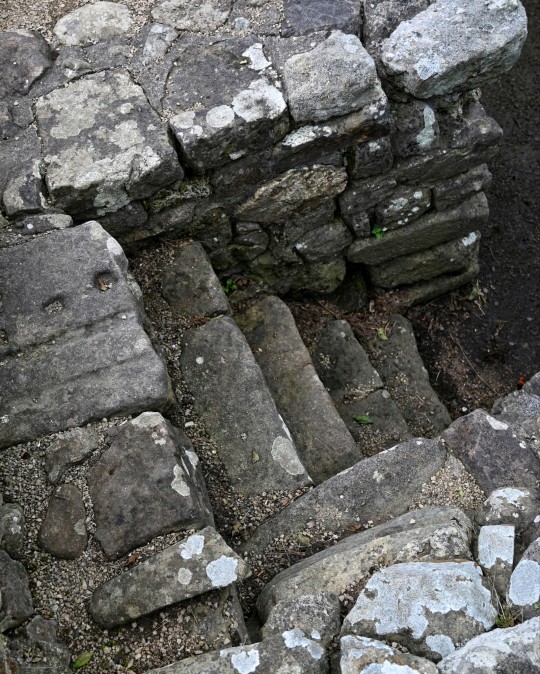







Segontium Roman Fort, Caernarfon, Wales
#roman fort#roman army#roman living#roman empire#romans#roman ruins#roman headquarters#barracks#archaeology#ancient living#ancient cultures#ancient craft#wales#Caernarfon#iron age#strongroom#well#gate house
131 notes
·
View notes
Text
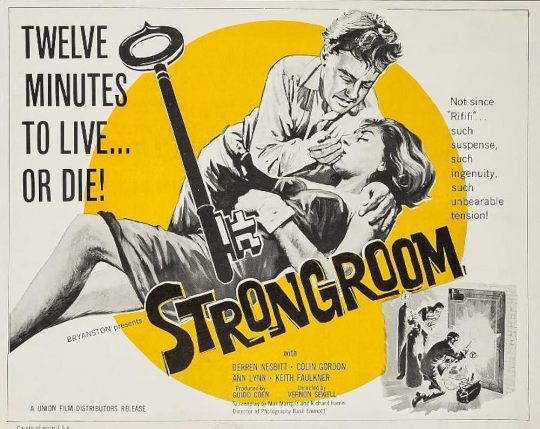
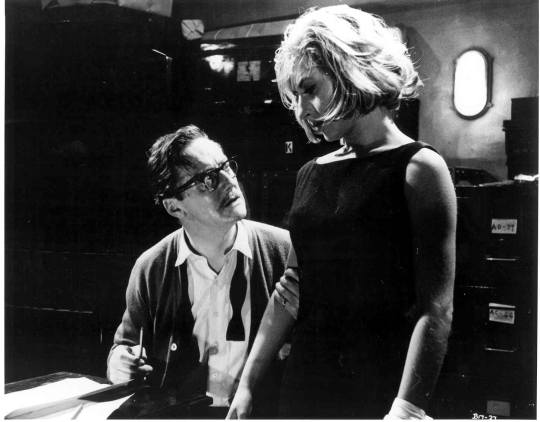

Strongroom (1962) Vernon Sewell
January 28th 2024
0 notes
Text
You know what gets me about Hancock’s strongroom?
There’s not much actually in there.
Obviously there’s the odd assortment of randomly generated guns & ammo, plus the caps you get from Bobbi. that’s to be expected.
But Hancock practically says that’s not even where he keeps most of his caps anyway when he calls the 1000 caps he asks back for chump change.
The non-generated stuff is two fusion cores, two stealth boys….
But what’s mostly in there are some waters and what amounts to a random assortment of snack foods like Fancy Lads and Sugar bombs. Those are always there.
Right next to a sleeping bag that’s got a few wooden blocks next to it.
Conclusion?
We broke into Hancock’s hangover room that he goes to whenever he just wants some damn peace and quiet.
#Fallout 4#Fallout Hancock#John Hancock#Fallout#also a Nuka Cola lunch box#sad HC is that the blocks are probably his childhood toys and one of the few things he has left from that time#Bobbi thinking she’s so clever breaking in only to find a couple of tablets of Tylenol and munchies food.
501 notes
·
View notes
Text
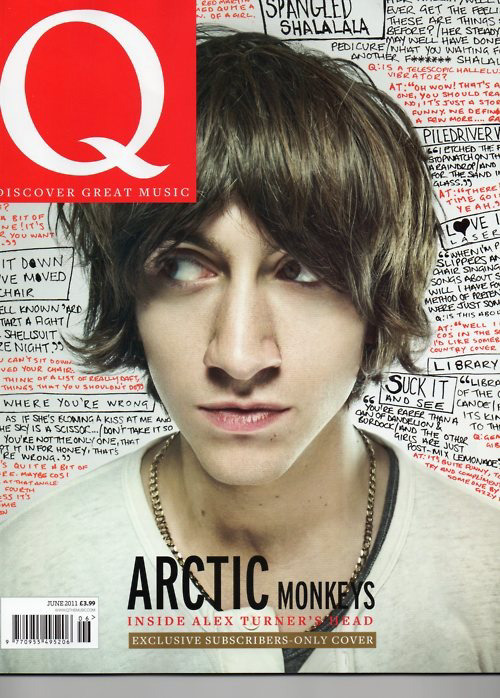

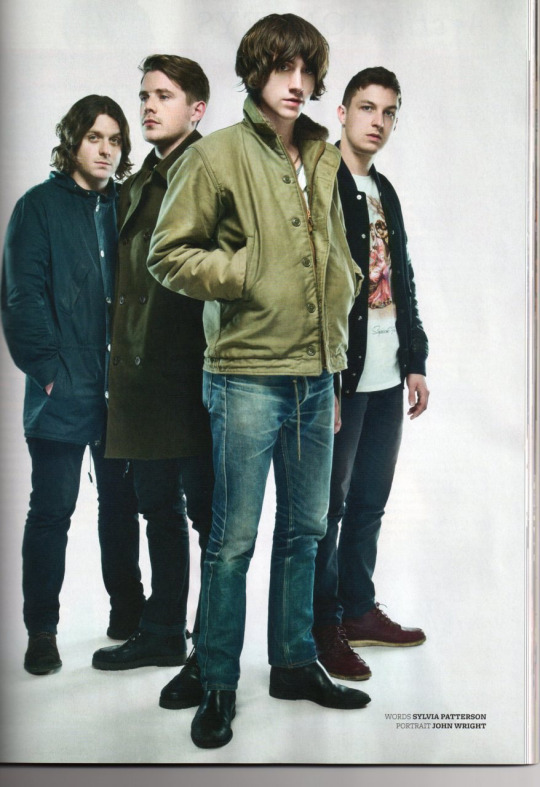
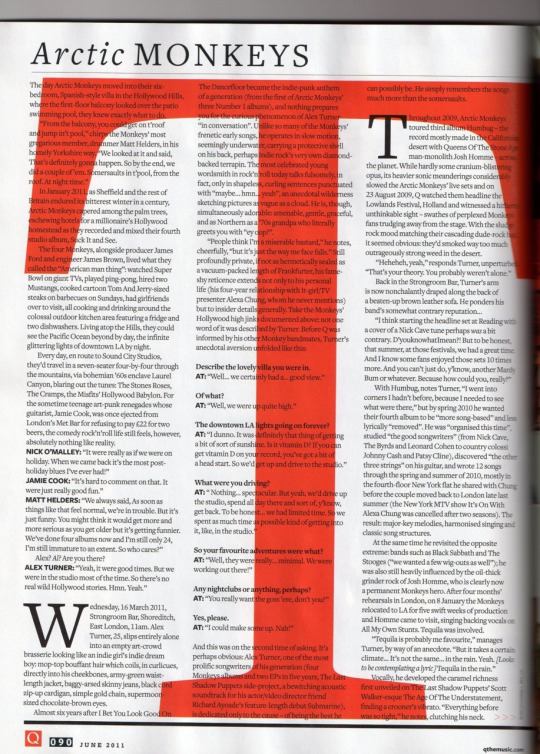

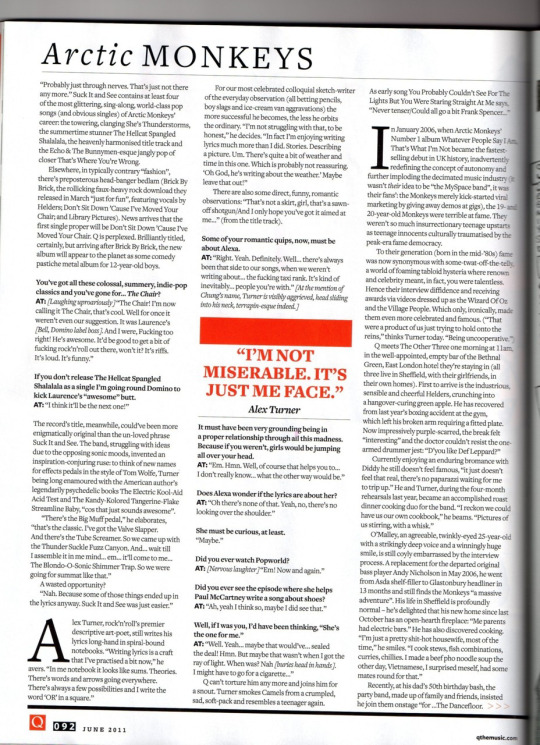


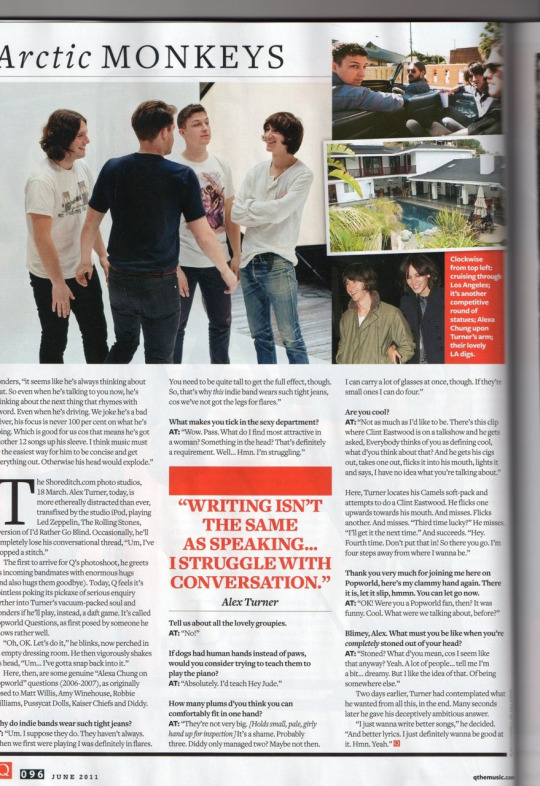
arctic monkeys for q magazine, june 2011 (x) (x)
ARCTIC MONKEYS: Inside Alex Turner's Head
Words Sylvia Patterson
Portrait John Wright
The day Arctic Monkeys moved into their six bedroom, Spanish-style villa in the Hollywood Hills, where the first-floor balcony looked over the patio swimming pool, they knew exactly what to do.
"From the balcony, you could get on t'roof and jump in't pool," chirps the Monkeys' most gregarious member, drummer Matt Helders, in his homely Yorkshire way. "We looked at it and said, That's definitely gonna happen. So by the end, we did a couple of 'em. Somersaults in t'pool, from the roof. At night time."
In January 2011, as Sheffield and the rest of Britain endured its bitterest winter in a century, Arctic Monkeys capered among the palm trees, eschewing hotels for a millionaire's Hollywood homestead as they recorded and mixed their fourth studio album, Suck It and See.
The four Monkeys, alongside producer James Ford and engineer James Brown, lived what they called the "American man thing": watched Super Bowl on giant TVs, played ping-pong, hired two Mustangs, cooked cartoon Tom And Jerry-sized steaks on barbecues on Sundays, had girlfriends over to visit, all cooking and drinking around the colossal outdoor kitchen area featuring a fridge and two dishwashers. Living atop the Hills, they could see the Pacific Ocean beyond by day, the infinite glittering lights of downtown LA by night.
Every day, en route to Sound City Studios, they'd travel in a seven-seater four-by-four through the mountains, via bohemian 60s enclave Laurel Canyon, blaring out the tunes: The Stones Roses, The Cramps, the Misfits' Hollywood Babylon. For the sometime teenage art-punk renegades whose guitarist, Jamie Cook, was once ejected from London's Met Bar for refusing to pay €22 for two beers, the comedy rock'n'roll life still feels, however, absolutely nothing like reality.
NICK O'MALLEY: "It were really as if we were on holiday. When we came back it's the most post-holiday blues I've ever had!"
JAMIE COOK: "It's hard to comment on that. It were just really good fun."
MATT HELDERS: "We always said, As soon as things like that feel normal, we're in trouble. But it's just funny. You might think it would get more and more serious as you get older but it's getting funnier. We've done four albums now and I'm still only 24, I'm still immature to an extent. So who cares?"
Alex? Al? Are you there?
ALEX TURNER: "Yeah, it were good times. But we were in the studio most of the time. So there's no real wild Hollywood stories. Hmn. Yeah."
Wednesday, 16 March 2011, Strongroom Bar, Shoreditch, East London, 11am. Alex Turner, 25, slips entirely alone into an empty art-crowd brasserie looking like an indie girl's indie dream boy: mop-top bouffant hair which coils, in curlicues, directly into his cheekbones, army-green waist-length jacket, baggy-arsed skinny jeans, black cord zip-up cardigan, simple gold chain, supermoon sized chocolate-brown eyes.
Almost six years after I Bet You Look Good On The Dancefloor became the indie-punk anthem of a generation (from the first of Arctic Monkeys' three Number 1 albums), and nothing prepares you for the curious phenomenon of Alex Turner "in conversation". Unlike so many of the Monkeys frenetic early songs, he operates in slow motion, seemingly underwater, carrying a protective shell on his back, perhaps indie rock's very own diamond-backed terrapin. The most celebrated young wordsmith in rock'n roll today talks fulsomely, in fact, only in shapeless, curling sentences punctuated with "maybe... hmn.. yeah", an anecdotal wilderness sketching pictures as vague as a cloud. He is, though, simultaneously adorable: amenable, gentle, graceful, and as Northern as a 70s grandpa who literally greets you with "ey oop?".
"People think I'm a miserable bastard," he notes, cheerfully, "but it's just the way me face falls." Still profoundly private, if not as hermetically sealed as a vacuum-packed length of Frankfurter, his fante-shy reticence extends not only to his personal life (his four-year relationship with It-girl/TV presenter Alexa Chung, whom he never mentions) but to insider details generally. Take the Monkeys’ Hollywood high jinks documented above: not one word of it was described by Turner. Before Q was informed by his other Monkey bandmates, Turner’s anecdotal aversion unfolded like this:
Describe the lovely villa you were in.
AT: "Well... we certainly had a... good view."
Of what?
AT: "Well, we were up quite high."
The downtown LA lights going on forever?
AT: "I dunno. It was definitely that thing of getting a bit of sort of sunshine. Is it vitamin D? If you can get vitamin D on your record, you've got a bit of a head start. So we'd get up and drive to the studio."
What were you driving?
AT: "Nothing... spectacular. But yeah, we'd drive up the studio, spend all day there and sort of, y know, get back. To be honest... we had limited time. So we spent as much time as possible kind of getting into it, like, in the studio.
So your favourite adventures were what?
AT: "Well, they were really… minimal. We were working out there!"
Any nightclubs or anything, perhaps?
AT: "You really want the goss 'ere, don't you?"
Yes, please.
AT: "I could make some up. Nah!"
And this was on the second time of asking. It's perhaps obvious: Alex Turner, one of the most prolific songwriters of his generation (four Monkeys albums and two EPs in five years, The Last Shadow Puppets side-project, a bewitching acoustic soundtrack for his actor/video director friend Richard Ayoade's feature-length debut Submarine), is dedicated only to the cause – of being the best he can possibly be. He simply remembers the songs much more than the somersaults.
Throughout 2009, Arctic Monkeys toured third album Humbug – the record mostly made in the Californian desert with Queens Of The Stone Age man-monolith Josh Homme – across the planet. While hardly some cranium-blistering opus, its heavier sonic meanderings considerably slowed the Arctic Monkeys' live sets and on 23 August 2009, Q watched them headline the Lowlands Festival, Holland and witnessed a hitherto unthinkable sight – swathes of perplexed Monkeys fans trudging away from the stage. With the sludge rock mood matching their cascading dude-rock hair it seemed obvious: they'd smoked way too much outrageously strong weed in the desert.
"Heheheh, yeah," responds Turner, unperturbed. "That's your theory. You probably weren't alone."
Back in the Strongroom Bar, Turner's arm is now nonchalantly draped along the back of a beaten-up brown leather sofa. He ponders his band's somewhat contrary reputation…
"I think starting the headline set at Reading with a cover of a Nick Cave tune perhaps was a bit contrary. D'youknowhat Imean?! But to be honest, that summer, at those festivals, we had a great time. And I know some fans enjoyed those sets 10 times more. And you can't just do, y’know, another Mardy Bum or whatever. Because how could you, really?"
With Humbug, notes Turner, "I went into corners I hadn't before, because I needed to see what were there," but by spring 2010 he wanted their fourth album to be "more song-based" and less lyrically "removed". He was "organised this time", studied "the good songwriters" (from Nick Cave, The Byrds and Leonard Cohen to country colossi Johnny Cash and Patsy Cline), discovered "the other three strings" on his guitar, and wrote 12 songs through the spring and summer of 2010, mostly in the fourth-floor New York flat he shared with Chung before the couple moved back to London late last summer (the New York MTV show It's On With Alexa Chung was cancelled after two seasons). The result: major-key melodies, harmonised singing and classic song structures.
At the same time he revisited the opposite extreme: bands such as Black Sabbath and The Stooges ("we wanted a few wig-outs as well"); he was also still heavily influenced by the oil-thick grinder rock of Josh Homme, who is clearly now a permanent Monkeys hero. After four months' rehearsals in London, on 8 January the Monkeys relocated to LA for five swift weeks of production and Homme came to visit, singing backing vocals on All My Own Stunts. Tequila was involved.
"Tequila is probably me favourite," manages Turner, by way of an anecdote. "But it takes a certain climate... It's not the same... in the rain. Yeah. [Looks to be contemplating a lyric] Tequila in the rain."
Vocally, he developed the caramel richness first unveiled on The Last Shadow Puppets' Scott Walker-esque The Age Of The Understatement, finding a crooner's vibrato. "Everything before was so tight,” he notes, clutching his neck. "Probably just through nerves. That's just not there any more." Suck It and See contains at least four of the most glittering, sing-along, world-class pop songs (and obvious singles) of Arctic Monkeys' career: the towering, clanging She's Thunderstorms, the summertime stunner The Hellcat Spangled Shalalala, the heavenly harmonised title track and the Echo & The Bunnymen-esque jangly pop of closer That's Where You're Wrong.
Elsewhere, in typically contrary "fashion", there's preposterous head-banger bedlam (Brick By Brick, the rollicking faux-heavy rock download they released in March "just for fun", featuring vocals by Helders; Don't Sit Down 'Cause I've Moved Your Chair, and Library Pictures). News arrives that the first single proper will be Don't Sit Down 'Cause I've Moved Your Chair. Q is perplexed. Brilliantly titled, certainly, but arriving after Brick By Brick, the new album will appear to the planet as some comedy pastiche metal album for 12-year-old boys.
You've got all these colossal, summery, indie-pop classics and you've gone for... The Chair?
AT: [Laughing uproariously] "The Chair! I'm now calling it The Chair, that's cool. Well for once it weren't even our suggestion. It was Laurence's (Bell, Domino label boss). And I were, Fucking too right! He's awesome. It'd be good to get a bit of fucking rock'n'roll out there, won't it? It's riffs. It's loud. It's funny."
If you don't release The Hellcat Spangled Shalalala as a single I'm going round Domino to kick Laurence's "awesome" butt.
AT: "I think it'll be the next one!"
The record's title, meanwhile, could've been more enigmatically original than the un-loved phrase Suck It and See. The band, struggling with ideas due to the opposing sonic moods, invented an inspiration-conjuring ruse: to think of new names for effects pedals in the style of Tom Wolfe, Turner being long enamoured with the American author's legendarily psychedelic books The Electric Kool-Aid Acid Test and The Kandy-Kolored Tangerine-Flake Streamline Baby, "cos that just sounds awesome".
"There's the Big Muff pedal," he elaborates, "That’s the classic. I've got the Valve Slapper. And there's the Tube Screamer. So we came up with the Thunder Suckle Fuzz Canyon. And… wait till I assemble it in me mind… em… it'll come to me… The Blonde-O-Sonic Shimmer Trap. So we were going for summat like that."
A wasted opportunity?
"Nah. Because some of those things ended up in the lyrics anyway. Suck It and See was just easier."
Alex Turner, rock'n'roll's premier descriptive art-poet, still writes his lyrics long-hand in spiral-bound notebooks. "Writing lyrics is a craft that I've practised a bit now," he avers. "In me notebook it looks like sums. Theories. There's words and arrows going everywhere. There's always a few possibilities and I write the word 'OR' in a square."
For our most celebrated colloquial sketch-writer of the everyday observation (all betting pencils, boy slags and ice-cream van aggravations) the more successful he becomes, the less he orbits the ordinary. "I'm not struggling with that, to be honest," he decides. "In fact I'm enjoying writing lyrics much more than I did. Stories. Describing a picture. Um. There's quite a bit of weather and time in this one. Which is probably not reassuring. 'Oh God, he's writing about the weather.' Maybe leave that out!"
There are also some direct, funny, romantic observations: "That's not a skirt, girl, that's a sawn-off shotgun/And I only hope you've got it aimed at me..." (from the title track).
Some of your romantic quips, now, must be about Alexa.
AT: "Right. Yeah. Definitely. Well... there's always been that side to our songs, when we weren't writing about... the fucking taxi rank. It's kind of inevitably... people you're with." [At the mention of Chung's name, Turner is visibly aggrieved, head sliding into his neck, terrapin-esque indeed.]
It must have been very grounding being in a proper relationship through all this madness. Because if you weren't, girls would be jumping all over your head.
AT: "Em. Hmn. Well, of course that helps you to... I don't really know.. what the other way would be."
Does Alexa wonder if the lyrics are about her?
AT: "Oh there's none of that. Yeah, no, there's no looking over the shoulder."
She must be curious, at least.
"Maybe."
Did you ever watch Popworld?
AT: [Nervous laughter] "Em! Now and again."
Did you ever see the episode where she helps Paul McCartney write a song about shoes?
AT: "Ah, yeah I think so, maybe I did see that."
Well, if I was you, I'd have been thinking, "She's the one for me."
AT: "Well. Yeah... maybe that would've... sealed the deal! Hmn. But maybe that wasn't when i got the ray of light. When was? Nah [buries head in hands]. I might have to go for a cigarette..."
Q can't torture him any more and joins him for a snout. Turner smokes Camels from a crumpled, sad, soft-pack and resembles a teenager again. As early song You Probably Couldn't See For The Lights But You Were Staring Straight At Me says, "Never tenser/Could all go a bit Frank Spencer…”
In January 2006, when Arctic Monkeys' Number 1 album Whatever People Say I Am, That's What I'm Not became the fastest-selling debut in UK history, inadvertently redefining the concept of autonomy and further imploding the decimated music industry (& wasn't their idea to be "the MySpace band", it was their fans': the Monkeys merely kick-started viral marketing by giving away demos at gigs), the 19- and 20-year-old Monkeys were terrible at fame. They weren't so much insurrectionary teenage upstarts as teenage innocents culturally traumatised by the peak-era fame democracy.
To their generation (born in the mid-'80s) fame was now synonymous with some-twat-off-the-telly a world of foaming tabloid hysteria where renown and celebrity meant, in fact, you were talentless. Hence their interview diffidence and receiving awards via videos dressed up as the Wizard OfOz and the Village People. Which only, ironically, made them even more celebrated and famous. (“That were a product of us just trying to hold onto the reins," thinks Turner today. "Being uncooperative.")
Q meets The Other Three one morning at 11am, in the well-appointed, empty bar of the Bethnal Green, Bast London hotel they're staying in (all three live in Sheffield, with their girlfriends, in their own homes). First to arrive is the industrious, sensible and cheerful Helders, crunching into a hangover-curing green apple. He has recovered from last year's boxing accident at the gym, which left his broken arm requiring a fitted plate. Now impressively purple-scarred, the break felt "interesting" and the doctor couldn't resist the one-armed drummer jest: "D'you like Def Leppard?"
Currently enjoying an enduring bromance with Diddy, he still doesn't feel famous, "it just doesn't feel that real, there's no paparazzi waiting for me to trip up." He and Turner, during the four-month rehearsals last year, became an accomplished roast dinner cooking duo for the band. "I reckon we could have us our own cookbook," he beams. "Pictures of us stirring, with a whisk."
O'Malley, an agreeable, twinkly-eyed 25-year-old with a strikingly deep voice and a winningly huge smile, is still coyly embarrassed by the interview process. A replacement for the departed original bass player Andy Nicholson in May 2006, he went from Asda shelf-filler to Glastonbury headliner in 13 months and still finds the Monkeys "a massive adventure". His life in Sheffield is profoundly normal – he's delighted that his new home since last October has an open-hearth fireplace: "Me parents had electric bars." He has also discovered cooking. “I’m just a pretty shit-hot housewife, most of the time," he smiles. "I cook stews, fish combinations, curries, chillies. I made a beef pho noodle soup the other day, Vietnamese, I surprised meself, had some mates round for that."
Recently, at his dad's 50th birthday bash, the party band, made up of family and friends, insisted he join them onstage "for ...The Dancefloor. So I were up there [mimes playing bass, all sheepish] and it were the wrong pitch, they didn't know the words or 'owt, going, Makin eyes... er..." He has no extra-curricular musical ambitions. "I'm happy just playing bass," he smiles. "I've never had the skill of doing songs meself. It'd be shit!"
Cook, 25, is still spectacularly embarrassed by the interview process. He perches upright, with a fixed nervous smile, newly shorn of the beard and ponytail he sported in LA: "Rockin' a pone, yeah, because I could get away with it." With his classic preppy haircut and dapper green military coat (from London's swish department store, Liberty), he looks like a handsome '40s film star. (Turner deems Cook "the band heartbreaker" and had a word with him post-LA: "I said to him, Come on, mate, you've got to get that beard shaved off. Get the girls back into us. Shift some posters.")
His life in Sheffield is also profoundly normal. He still plays Sunday League football with his local pub team, The Pack Horse FC (position, left back), remains in his long-term relationship with page-three-model-turned-make-up-artist Katie Downes and "potters about" at home, refusing to describe said home, "cos I'll get burgled".
A tiler by trade, he always vowed, should the Monkeys sign a deal, that he'd throw his trowel in a Sheffield river on his last day of work. "I never did fling me trowel," he confirms. "Probably still in me shed." He's never considered what his band represents to his generation. "I'd go insane thinking about it, I'm pretty good at not thinking about it… Oh God. I'm terrible at this!"
Back in the Strongroom Bar, Alex Turner is cloudily describing his everyday life. "I just keep meself to meself," he confounds. He mostly stays indoors and his perfect night in with Alexa is "watching loads of Sopranos. And doing roast dinners".
No longer spindle-limbed, he attends a gym and has handsomely well-defined arms – "You have to look after yourself."
Suddenly, Crying Lightning from Humbug rumbles over the bar stereo. "Wow. How about that? I was quite happy the other morning cos Brick By Brick were on the round-up goals on Soccer AM. It's still exciting when that happens. It was like Brick By Brick is real."
He spends his days writing music, "listening to records", and recommends Blues Run The Game by doomed '60s minstrel Jackson C Frank ("who's that lass?... Laura Marling, she did a cover recently), a simple, acoustic, deep and regretful stunner about missing someone on the road.
Lyrically, he cites as an example of greatness the Nick Cave B-side Little Empty Boat [from ‘97 single Into My Arms ], a comically sinister paean to a sexual power struggle: "Your knowledge is impressive and your argument is good/But I am the resurrection babe and you're standing on my foot."
"I need a hobby," he suddenly decides. "I'd like to learn another language." Since his mum is a German teacher (his dad teaches music), surely he can speak some German? "I know how to ask somebody if they've had fun at Christmas." Go on, then. "Nah!"
Where Turner's creative gifts stem from remains a contemporary rock'n'roll mystery; he became a fledgling songwriter at 16, after the gift of a guitar at Christmas from his parents. An only child, did his folks, perhaps, foresee artistic greatness? "I doubt it!" he balks. "Cos I didn't. I wasn't... a show kid." Like the others, he doesn't analyse the past, or the future.
"You can't constantly be thinking about what's happened," he reasons, "it's just about getting on with it." The elaborate pinky ring he now constantly wears, however, a silver, gold and ruby metal-goth corker featuring the words DEATH RAMPS is a permanent reminder of he and his best friends’ past. The Death Ramps is not only a Monkeys pseudonym and B-side to Teddy Picker, but a place they used to ride their bikes in Sheffield as kids.
"Up in the woods near where we lived," he nods. "Just little hills. But when you're eight years old they're death ramps." The ring was custom made by a friend of his, who runs top-end rock'n'roll jewellery emporium The Great Frog near London's Carnaby Street. Ask Turner why he thinks the chase between his writing and speaking eloquence is quite so mesmerisingly vast and he attempts a theory.
"Well, writing isn't the same as speaking," he muses. "Not for me. I seem to struggle more and more with... conversation. Talking onstage... I can't do it any more. Hmn. I'll have to work on that."
The ever-helpful Helders has a better theory.
"Since he's been writing songs," he ponders, “It seems like he’s always thinking about that. So even when he’s talking to you now, he’s thinking about the next thing that rhymes with a word. Even when he’s driving. We joke he’s a bad driver, his focus is never 100 per cent on what he’s doing. Which is good for us cos it means he’s got another 12 songs up his sleeve. I think music must be the easiest way for him to be concise and get everything out. Otherwise his head would explode.”
The Shoreditch.com photo studios, 18 March. Alex Turner, today, is more ethereally distracted than ever, transfixed by the studio iPod, playing Led Zeppelin, The Rolling Stones, a version of I’d Rather Go Blind. Occasionally, he’ll completely lose his conversational thread, “Um. I’ve dropped a stitch.”
The first to arrive for Q’s photoshoot, he greets his incoming bandmates with enormous hugs (and also hugs them goodbye). Today, Q feels it’s pointless poking its pickaxe of serious enquiry further into Turner’s vacuum-packed soul and wonders if he’ll play, instead, a daft game. It’s called Popworld Questions, as first posed by someone he knows rather well.
“Oh, OK. Let’s do it,” he blinks, now perched in an empty dressing room. He then vigorously shakes his head, “Um…I’ve gotta snap back into it.”
Here, then, are some genuine “Alexa Chung on Popworld” questions (2006-2007), as originally posed to Matt Willis, Amy Winehouse, Robbie Williams, Pussycat Dolls, Kaiser Chiefs and Diddy.
Why do indie bands wear such tight jeans?
AT: “Um. I supposed they do. They haven’t always. When we first were playing I was definitely in flares. You need to be quite tall to get the full effect, though. So, that's why this indie band wears such tight jeans, cos we've not got the legs for flares."
What makes you tick in the sexy department?
AT: "Wow. Pass. What do I find most attractive in a woman? Something in the head? That's definitely a requirement. Well... Hmn. I'm struggling."
Tell us about all the lovely groupies.
AT: "No!"
If dogs had human hands instead of paws, would you consider trying to teach them to play the piano?
AT: "Absolutely. I'd teach Hey Jude."
How many plums d'you think you can comfortably fit in one hand?
AT: "They're not very big. [Holds small, pale, girly hand up for inspection] It's a shame. Probably three. Diddy only managed two? Maybe not then. I can carry a lot of glasses at once, though. If they're small ones I can do four."
Are you cool?
AT: "Not as much as I'd like to be. There's this clip where Clint Eastwood is on a talkshow and he gets asked, Everybody thinks of you as defining cool, what d'you think about that? And he gets his cigs out, takes one out, flicks it into his mouth, lights it and says, I have no idea what you're talking about."
Here, Turner locates his Camels soft-pack and attempts to do a Clint Eastwood. He flicks one upwards towards his mouth. And misses. Flicks another. And misses. "Third time lucky?" He misses. "I'll get it the next time." And succeeds. "Hey. Fourth time. Don't put that in! So there you go. I'm four steps away from where I wanna be."
Thank you very much for joining me here on Popworld, here's my clammy hand again. There it is, let it slip, hmmn. You can let go now.
AT: "OK! Were you a Popworld fan, then? It was funny. Cool. What were we talking about, before?"
Blimey, Alex. What must you be like when you're completely stoned out of your head?
AT: "Stoned? What d'you mean, cos I seem like that anyway? Yeah. A lot of people... tell me I'm a bit... dreamy. But I like the idea of that. Of being somewhere else."
Two days earlier, Turner had contemplated what he wanted from all this, in the end. Many seconds later he gave his deceptively ambitious answer.
"I just wanna write better songs," he decided. "And better lyrics. I just definitely wanna be good at it. Hmn. Yeah.”
—
RUFUS BLACK: AKA Matt Helders, on his ongoing bromance with Diddy
Matt Helders has known preposterous rap titan Diddy since they met in Miami in 2008. “He goes, Arctic Monkeys! Then he said summat about a B-side and I was like, He's not lying! I just thought, This is funny, I'm gonna go with this for a while." Last October Diddy texted Helders, suggesting he play drums with his Diddy Dirty Money band on Friday Night With Jonathan Ross, to give his own drummer a day off. “I were bowling with me girifriend at the time. In Sheffield, on a Sunday." On the day of recording, says Helder, "We had a musical director. That were one of the maddest times of my life. Next day Diddy said, Why don't you just stay? Come along with me. So I went everywhere with him." Diddy had "a convoy of cars" and made sure Helders was always in his. "He'd stop his car and go, Where's Matt? You're coming with me! So I'd get in his car. Just me, him, his security, driver." Diddy, by now, had given him a pseudonym - Rufus Black. "He kept saying, I don't wanna fuck up your image. And I'm, I don't think it's gonna do me any harm!" He stayed in Diddy's spectacularly expensive hotel. Some weeks later, Helders almost returned to the Dirty Money drumstool for a gig in Glasgow. "But we were rehearsing in London. I were like, I might come, how are you getting there? And he were like, Jet. Jump on t’jet with me. But I had to stay in Bethnal Green instead.”
Love’s young dream: Diddy (left) with Helders
#arctic monkeys#alex turner#matt helders#nick o'malley#jamie cook#sias era#interviews#q magazine#my image id#bands#this is such a funny interview honestly shfjwjs#self proclaimed housewife nick my beloved......#also why did the interviewer describe alex's hands as small pale and girly HELPME#btw im missing page 93 it's probabky just a photospread but yeah#i managed to find the dead links' images on vk#eye contact#not my scan
254 notes
·
View notes
Note
Sole getting caught by Hancock by pickpocketing him or stealing his caps which leads to a misunderstanding as sole gets turned on by the thrill of the situation which Hancock didn't know about.
Thank you for requesting! I'm not too happy with how this turned out, but my god this request has been in my inbox for literal years so it was about time I answered it. Sorry it took me forever!
It was a random Tuesday evening. You and Hancock had just gotten back to Goodneighbor to check how the place was holding up without their mayor present. Hancock had gone off to talk to some of the more important people in town while you decided to just hang out in the Old State House. You were tired from traveling and your legs were heavy, but you weren’t sure about sleeping arrangements. Before Hancock became one of your traveling buddies, you’d stay in Hotel Rexford whenever you spent the night in Goodneighbor. You weren’t sure how things would go tonight, so the only thing you could do was wait for the mayor to return from his business talks. In the meantime, you were walking around the second floor, checking out the decorations of the place while twirling a canister of jet in your hand. However, suddenly a hand wrapped around your wrist and with a hard tug your body spun around to your captor: Mayor Hancock himself. Took him long enough.
“What’s that you got in your hand, sunshine?” the ghoul asked, his voice low and raspy.
You didn’t notice yet that something was up.
“Just some jet,” you answered plainly.
“Some jet that doesn’t belong to you.”
Your eyes narrowed slightly. Was he pissed? Sure, you found the jet on his coffee table but you didn’t see the problem. He frequently gave you chems while traveling so why would this be any different? However, you also didn’t mind angering him.
“Of the people, for the people, right?” You mocked him.
Hancock chuckled, and your heart jumped in your chest.
You and Hancock had a strange relationship. At first, you didn’t really like him. The way he towered over people from his balcony, and rewarded them with free chems for answering simple questions as if they were dogs doing tricks he taught them rubbed you the wrong way. So when Bobbi tricked you into raiding Hancock’s strongroom, you stuck with her. You thought you’d no longer be welcome in Goodneighbor after killing Fahrenheit, but Hancock was strangely chill about it. That was when your dynamic changed: He ordered you to kill Bobbi. It was intimidating, threatening even. But it was the first time you understood why people were attracted to him. You’ve been traveling together ever since and unfortunately, you never saw that side of him again, until now maybe?
“You know damn well I don’t tolerate people stealing from me. Now if this was your first offense against me, I’d let it go, but it’s not, is it? Can’t have this turning into a habit.”
Your heart was racing now.
“So what will you do about it?” You said it in a challenging way, but you were full-on ready to obey his every command.
“Good question.” Hancock took the jet from your hand and created some distance between you two. He leaned against the couch and crossed his arms over his chest, his gaze was stuck on you. “How about some community work, huh? Heard Daisy could use help dealing with some bigots.”
Community work??? If this was a movie scene, the music would now be cut off abruptly by a record scratch.
“You’re joking,” you deadpanned.
“I’m not. Now get out of my sight.”
You didn’t move, however. Stubbornly, you crossed your arms over your chest and pulled your eyebrows up at him. “And what if I refuse?”
Hancock chuckled and looked down to the ground. Your heart was racing, anticipating his every move. You knew you’d be in real danger if you pissed him off too much, but this entire argument was about 1 canister of jet, so you were pretty sure it wasn’t going to escalate. “I’m tired, sweetheart. Let’s not do this.”
“Come on, Hancock, it’s one canister of jet that I didn’t even use. You’re the one making a big deal out of this.”
“You know what, you’re right,” he said. No. No, no, no. “I guess I really am tired. I’ll let it go this time, just don’t do it again.”
You almost sighed out loud. This was not how it was supposed to go… Guess you’d have to steal from him again…
-----------------------------------------------------------------------
A few days passed. The two of you were still in Goodneighbor and random chems kept mysteriously disappearing from Hancock’s stash. Of course, he suspected you, but you deliberately had been sneaky about it to rile him up.
Now it was finally time to let him catch you. You took some jet - as that was the chem that had started this all - and kept it in your pockets to use at the perfect time. That time was now: You were hanging around Hancock’s bedroom, door wide open, and had just heard him come up the stairs.
“Are you deliberately trying to piss me off?”
You turned to Hancock who was leaning against the door post with his arms crossed over his chest. You had just taken a hit and let out a relieved exhale before throwing the empty canister of jet to the ground.
“I don’t know what you’re talking about.”
Hancock chuckled lowly and pushed himself away from the doorpost, after which he started to approach you. Your heart was racing in your chest. This time, you couldn’t screw up.
“Which part of ‘don’t steal from me’ is too hard for you to understand, sweetheart?”
“Oh you said ‘don’t’? I must’ve misunderstood,” Your tone was dripping with dishonesty. “Thought you were all about sharing.”
“Do we have a problem here?” It wasn’t clear if it was supposed to sound threatening or if he genuinely wondered if things had gone south between you two. But one thing was obvious: He still wasn’t catching on.
“A problem? Us? I don’t think so,” you said innocently. Then you took a step towards him. Your bodies were almost touching now and you let one of your hands rest on his chest. You were done being subtle. You thought he’d figure things out quickly, but so far it had failed so it was time to just make things plain obvious. “But it seems you’ve been having trouble with some chem thief. You should do something about that.”
Hancock hummed. "And seeing as you're always so helpful, I'm sure you've got some suggestions for handling this thief?"
You bit your lip and let your hand slowly travel down his body. Though you were behaving confidently, deep down you were a nervous wreck. "I guess you could punish them."
You could see it in his eyes: a sudden realization. He had finally put two and two together, but his reaction wasn’t what you had anticipated. You thought he’d get a bit cocky, instead, his nickname for you quietly left his mouth and he took a step back. Or well, he tried to, but your hand that was now close to his abdomen took hold of his shirt and pulled him back. “Don’t you dare back off now,” you growled lowly. “I keep trying to piss you off because it’s hot as fuck, but you keep forgiving me.”
Hancock chuckled. “What can I say? It seems I just have a soft spot for you.” Then he turned serious. “You sure you want this, sweetheart?”
You nodded eagerly. “Please.”
“Ever been with a ghoul before?”
“What’s it matter? I-”
“We look different.”
“I’m aware,” you said with a small smirk and raised eyebrows but it clearly didn’t set him at ease.
“Everywhere, Sole.”
“Okay, let me spell it out for you: I. Want. You. That clear enough?”
Hancock let out a small chuckle. “Fine. But you suddenly change your mind? I do something you don’t like? You tell me, okay? We’ll stop immediately.”
“Okay. Now can you please go back to threatening me?”
30 notes
·
View notes
Photo
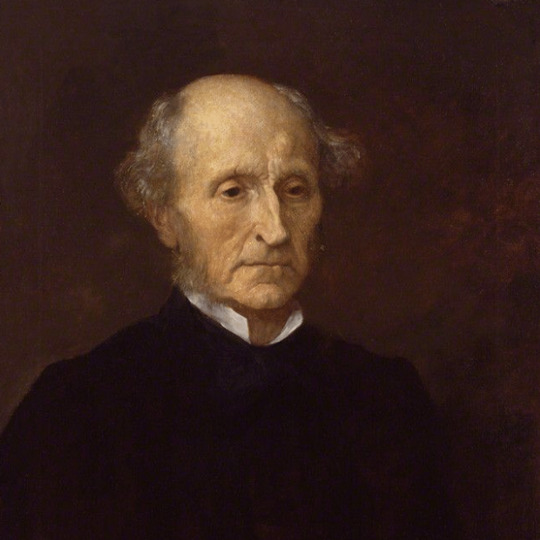
John Stuart Mill
John Stuart Mill (1806-1873) was a highly influential English philosopher of the Victorian Era. His writings were influenced by the Enlightenment thinkers and German Romanticism. Besides philosophical works, he wrote on mathematics, language, and logic. Well ahead of his time, he advocated the abolition of slavery and was a proponent of both children's and women's rights. However, he is best remembered for his essays on utilitarianism, a philosophy developed by Jeremy Bentham (1748-1832).
Life
Born on 20 May 1806 in London, England, John Stuart Mill was the son of the Scottish radical thinker James Mill. James had moved to London to promote Bentham's utilitarian philosophy. Through his father's use of the Socratic method, John was educated by James in the psychological and educational principles of utilitarianism. He was schooled in law, psychology, economics, mathematics, and logic. James Strangroom in his The Great Philosophers wrote that Mill's father's aim was to turn him into a calculation machine. Some believe James accomplished his goal. At the age of three, he read Greek, and at age eight, Latin. By the time he was 14, he had read most of the classic Greek and Latin texts in their original languages. Later, while still in his teens, he edited many of Bentham's unpublished manuscripts.
Like his father, at age 17, he began to rise through the ranks of the British East India Company, remaining there until it closed in 1858. He suffered a nervous breakdown when he was 20. Many believe his repeated bouts of depression were a reaction to the impersonal disciplined teaching of his father and the overwhelming domination that his father imposed on everything in his life. In his The Great Philosophers, Jeremy Strongroom wrote that Mill had been prepared for argumentation and analysis but received no training to help him cope with emotional moods. Luckily, his newfound interest in culture, theater, and the works of English poet William Wordsworth (1770-1850) helped him escape his depression.
In 1852, he married a long-time friend, Harriet Taylor, two years after the death of her first husband. She proved to have a significant influence on Mill as his foremost consultant and critic. She died in 1858. Seven years later, he became a member of Parliament (1865-1868) serving only one term. Mill died on 8 May 1873 in Avignon, France. Among his major works are A System of Logic (1853), On Liberty (1859), and The Subjection of Women (1869).
Continue reading...
21 notes
·
View notes
Text
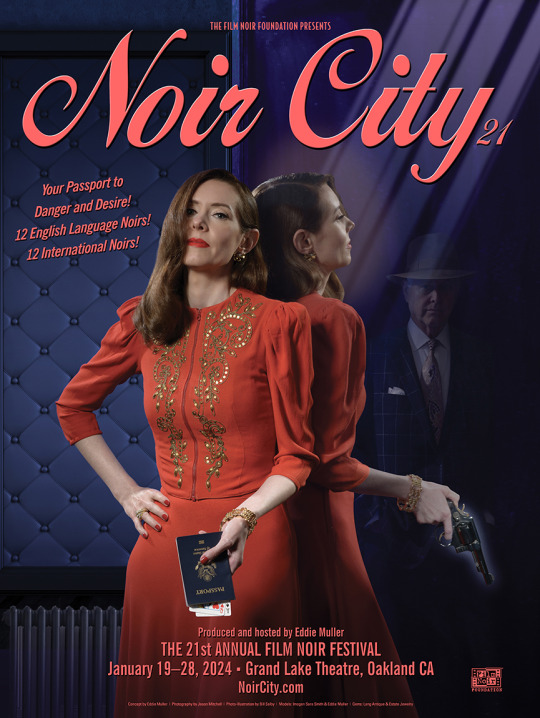
NOIR CITY 21
Celebrating its 21st year, NOIR CITY, the largest annual film noir festival in the world, returns to Oakland's Grand Lake Theatre, January 19-28, 2024. FNF president Eddie Muller will present a dozen double bills pairing an English language noir with a similarly themed foreign language film—24 films over 10 days. Whatever the country of origin, there are heists, prison breaks, missing persons, cultural alienation, love triangles, and lots of plain old-fashioned murder.
Muller says this edition "has been tailored to satisfy those folks who love noir filled with the colorful vernacular slang so essential to American and British noir—as well as adventurous viewers intrigued by seeing a familiar story—typically a crime committed for passion or profit—play out in cultures with different values, mores, and styles." Through his programming of NOIR CITY festivals around the nation and his hosting of the popular Noir Alley franchise on Turner Classic Movies, Muller aims to move audiences past the idea that film noir is a strictly American genre.
Joining him this year, as co-programmer and co-host, is acclaimed film scholar Imogen Sara Smith, a familiar commentator on The Criterion Channel streaming service. "Attending NOIR CITY in the Bay Area has been a highlight of my year for over a decade," says Smith, "and I'm thrilled to be joining Eddie as co-host this year. I'm especially excited that the program we've put together will introduce audiences to some rare international titles, alongside Hollywood classics. It's going to be a stellar festival."

Kicking off the collection of rarities is the FNF's most recent restoration — 1952's Argentine film Never Open That Door (No abras nunca esa puerta) — based on two short stories by American master of suspense fiction, Cornell Woolrich. The picture was preserved by the Film Noir Foundation in 2013 and has now been completely restored by the FNF through UCLA Film & Television Archive, thanks in part to a grant from the Golden Globe Foundation (formerly HFPA). Fernando Martín Peña, Argentina's pre-eminent cinephile, will be on hand to introduce the film with Eddie Muller.
Included on the 2024 schedule are English-language rarities such as Black Tuesday (1954), Plunder Road (1957), Across the Bridge (1957), and Strongroom (1962). Little-seen international titles include The Human Beast (France, 1938), Aimless Bullet (South Korea, 1960), Bitter Rice (Italy, 1949), Four Against the World (Mexico, 1950), Zero Focus (Japan, 1961), and Smog (1962), a forgotten surrealist masterpiece by Italian director Franco Rossi freshly restored by UCLA Film & Television Archive. Explore the full line up, buy tickets for individual double features and Passports (All-Access Passes) at the festival website.
GO TO NOIR CITY
#noir city#film noir foundation#eddie muller#film restoration#noir city 21#noir city oakland#grand lake theatre#imogen sara smith#Argentine film noir#35mm screening#film noir festival#never open that door#cornell woolrich#Martín Peña#tcm#noir alley#criterion channel#No abras nunca esa puerta
20 notes
·
View notes
Text
Things you don't expect to look up when reading a Sherlock Holmes story: "When did gas chambers become a thing?"
Turns out they were executing people in gas chambers in the States by 1927, when this story came out - ACD tends not to care very much about whether this makes sense when the story is set, but it is of course possible that Amberley in the late 1890s could look at the big metal box that was his strongroom and think 'What if I hooked up the gas pipes to that?' A different murderer had a similar thought in 'The Greek Interpreter', using incomplete combustion to kill people with carbon monoxide.
The answer to 'what if I did that', incidentally, is 'that's a really good way to blow up your house'. So don't try that at home. Or any of the rest of the stuff he did.
How did he even get them to go into the room?
30 notes
·
View notes
Text
URL Song Tag Game
Thank you for the tags @budgie2budgie @igglemouse @zosa95 and @theosconfessions ❤️
S - Solid Ground - Alex Vargas
I - Iron - Woodkid
R - Rule The World - Mads Langer
I - It's Easier (Strongroom Session) - John Grant
A - Anywhere Away From Here - Rag’n’Bone Man & P!nk
N - Nobody Else Will Be There - The National
A - Almost Touch Me - Maisy Kay
S - Something About Her - BATHSHEBA
I - I Am the Antichrist to You - Kishi Bashi
M - Midas - Skott
S - Sex With A Ghost - Teddy Hyde
I've lost track of who has already been tagged, so if you see this, you're tagged! Tell them I sent you ❤️
15 notes
·
View notes
Note
In "The Battle of the Fords" its mentioned that there are a dozen fords on the Red Fork, and so building a castle-bridge on each of these sites may be too costly. However, what about the Blue Fork? When Robb's army is trying to make it to the Twins for Edmure's wedding they try to cross the Blue Fork, but heavy rain forces them to go around. During the chapter, only three crossing sites are mentioned (a ford at a village called Ramsford and bridges at Fairmarket and Oldstones).
As always, the answer is "it depends."
River crossings washing out after heavy rains was just a fact of life in the medieval era. After a heavy rain, you'd expect any dirt road to be washed out, and any common ford likely flooded beyond use until the excess water drained out. So just the notion that the Blue Fork flooded out when Robb wanted to cross it is not necessarily indicative of the need to have a Twins-style stone-bridged castle at every major crossing point.
First, how many crossings are on the Blue Fork, and how far apart are they from each other? Three crossing sites are mentioned, but it's not said that there are only three crossings and no others. Fewer crossings are better, that makes them more valuable - useful for toll collection and thus viable to have an apparatus set up to collect them. To collect tolls, you need people to monitor the crossing, who are going to need places to eat and sleep. You'll need a strongroom to store the tolls until it's time to send them back to the feudal overlord for taxes.
Second, what is the state of this crossing? Who's using the river? How busy is the crossing? Fairmarket might not have as much need for a toll crossing - people would probably be coming to Fairmarket to sell their goods, not passing through Fairmarket. In the event that someone was passing through to sell goods elsewhere (such as delivering a commission), they'd probably just pay market fees to Fairmarket and crossing the bridge would be considered part of that.
Third, who owns the fief where the crossings are, and what feudal rights do they have? You might have one of the most lucrative river crossings on your fief ever, but if you don't have the right to build a castle or collect a toll, you're out of luck. Collecting a toll you're not entitled to (or charging more than you're allowed to) makes you a robber baron, and liable to receive punishment from your feudal overlord. You might be able to get away with using brigands as a shakedown operation as a deniable asset, but you can't exactly hide a castle.
Fourth, what are the weather patterns? A place with heavy rains that frequently sees roads washing out might really benefit from a big stone bridge that permits all-weather travel, making a castle like the Twins more valuable. But a place where this sort of thing doesn't happen as often might not be worth the investment, especially if there are other, more valuable places to build a fortification.
So maybe there's a good place for a toll castle on the Blue Fork. But maybe there isn't.
Thanks for the question, Anon.
SomethingLikeALawyer, Hand of the King
19 notes
·
View notes
Text


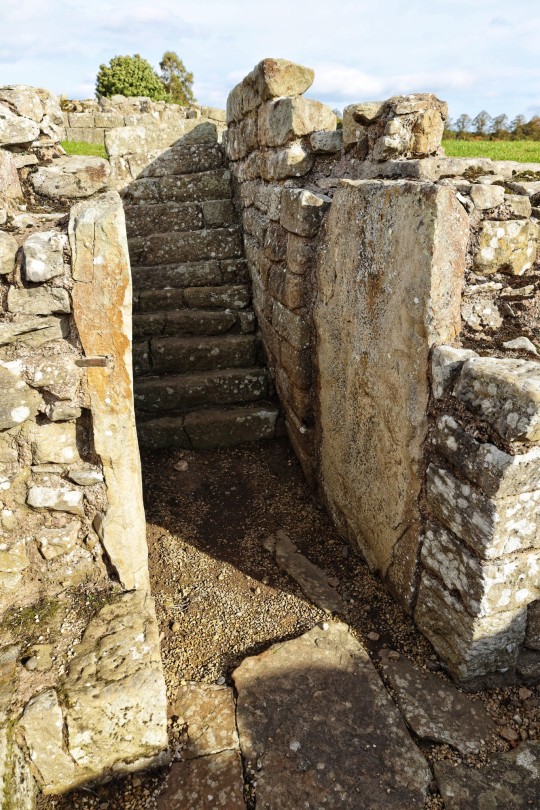

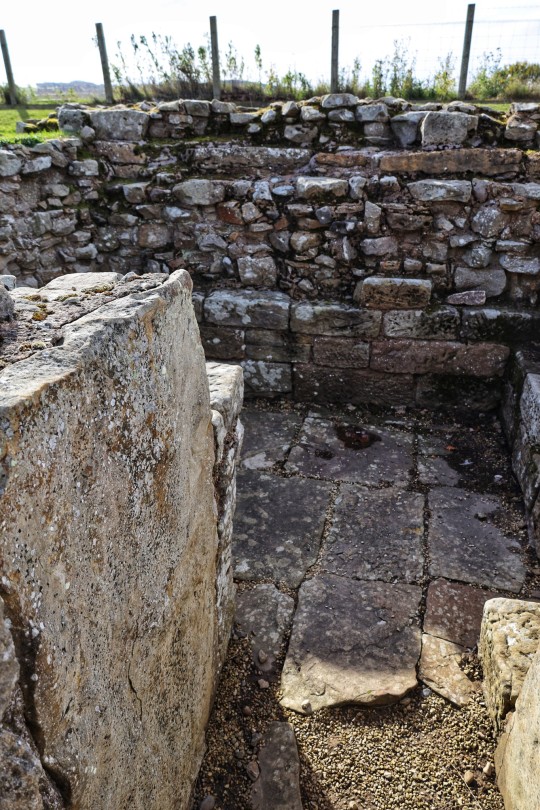
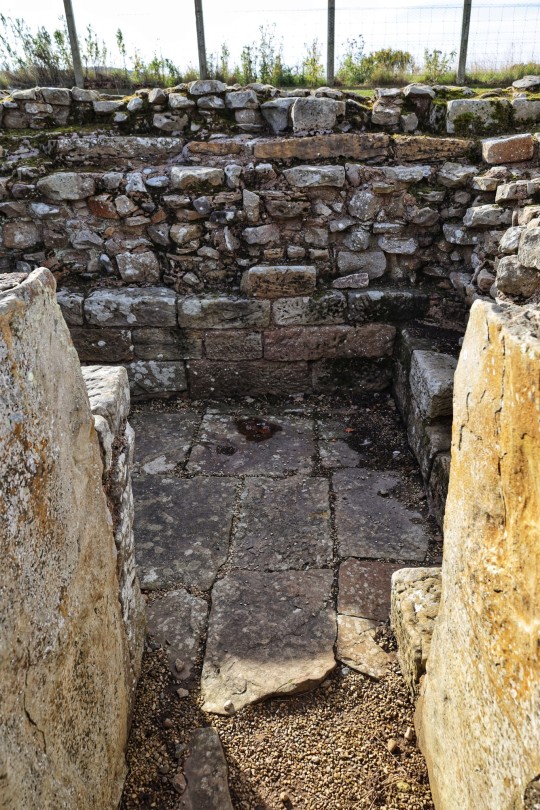
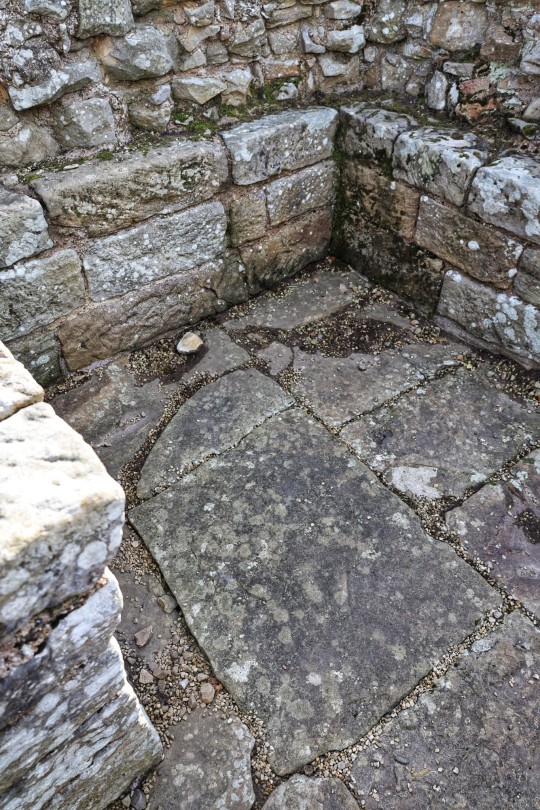

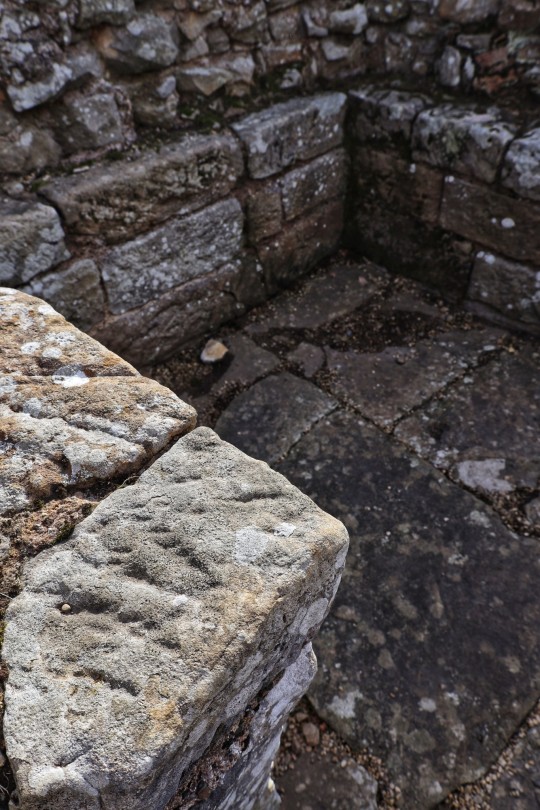

Roman Military Strongroom, Corbridge Roman Town, Corbridge, nr. Hadrian's Wall, Northumberland
#roman army#roman building#roman style#romans#roman#roman empire#roman britain#archaeology#Northumberland#relic#roman fort#Corbridge#ancient culture#ancient living#roman border
68 notes
·
View notes
Text
tagged by @phoneymedic to shuffle my on repeat spotify playlist and list the first 10 songs! thank you so much and i’m so so sorry that it took so long </3
1. autopsy/ blind channel
2. you’re gonna go far, kid / the offspring
3. sk8er boi / avril lavigne
4. neon noir / vv
5. in trenodia / vv
6. saturnine saturnalia/ vv
7. join me in death - strongroom mix / him
8. venus doom / him
9. i love you / him
10. agnieszka już dawno… / łzy
tagging: @foreverlostinyou @jascurka @pierregaslyliked @h3artk1ller @holi-holy @spectralstormcloud @ugl1mushroom
#sorry once again!#i was travelling a lot and i didn’t really have time to be here#also my taste is diverse thank you for asking just not right now#lulu tag
35 notes
·
View notes
Text
Favourite parts of Robin Hood season 2
1. Sisterhood - Guy is cruel to Marian and burns Knighton Hall, Robin saves himself without help from the snake pit
2. The Booby and the Beast - the strategic strongroom heist, Guy is jealous of the Count wooing Marian, the whole Sheriff-Guy-Marian-Count dynamics in the games room
3. Childhood - actually a top tier episode, Guy catches kids but won't kill them, Marian walks in on Guy undressed but he's not charmed, the gang's plans are foiled by Allan's secret pub nights with Guy, the Sheriff takes the rocks out of the box, Guy fights in a ridiculous suit of armour, Guy cries like a baby as Robin tries to drown him, Marian threatens the armour-maker's life, Guy is dirty with wet hair but slightly less spiteful to Marian
4. The Angel of Death - Will turns pale and evil, Joseph poses as the Nightwatchman, almost poisons the gang with soup, Guy and Marian talk through the door, Robin pretends to poison himself to break Will, they give the Sheriff the antidote because they love him so much
5. Ducking and Diving - Robin can't trust anyone, the messenger speaks nonsense ('pork!'), Matilda is saved when being ducked by an underwater tube, John forms a bond with the birthing daughter, Robin hits Will to draw out the traitor and is ruthless in attacking Allan
6. For England...! - Guy gives Marian pretty dresses, the gang masquerade as musicians, Allan nags Guy while he's dressing and gets his own costume, Robin's ready to die and thinks he killed all the Black Knights for a second, Lord Winchester is no one's ally, Guy did not agree to the Sheriff selling Marian, Guy almost helps Marian escape but can't resist the Sheriff's persuasion, Robin and Allan battle it out over the cauldron, Guy and the Sheriff save Marian before Robin and Marian rides on Guy's (beautiful) horse
7. Show Me the Money - Marian stops Robin killing Allan and gains Allan's allegiance, Edward gets some courage and the Pact, Marian grieves and Guy tries to comfort her, she runs to Robin instead
8. Get Carter! - Guy is desperate to find Marian, the gang pretend Carter has killed Robin, Guy almost stabs Robin to make sure, Guy confesses his desires and Marian her sympathy, Marian gives him a good kiss and Guy thinks he's won in life
9. Lardner's Ring - which fool told the King's messenger about Robin's exile? The Fool, the Fool annoys Guy and the Sheriff over dinner, Marian is dangled from the tree as a hostage and Guy gets her down ('you're coming home with me' à la Thornton), the Sheriff gets a hawk to kill the pigeon
10. Walkabout - the Sheriff out and about in his silk pyjamas, Guy is left in charge of scrabbling to find the Sheriff, Marian is too headstrong to leave with Guy, the army closes in as the sun sets, Guy finds nobility and stays for Marian, the Sheriff thinks everyone incapable
11. Treasure of the Nation - Marian rebukes Guy for his changes in character, Guy unmasks the Nightwatchman and sees the stab wound, Marian pleads for Guy to spare her, Allan poses as the Nightwatchman, Guy bears the Sheriff's knife on his throat, Marian is thankful and stays for Guy
12. A Good Day to Die - Marian tries to kill the Sheriff, Robin and Much address their bromantic issues, an awkward roadtrip to the Holy Land, the Sheriff calls Guy Gizzy, Marian sleeps in the barn, Guy tries to ask Allan if Marian's single, the Sheriff, Guy and Allan share a dorm and Allan's bed is empty in the morning
13. We Are Robin Hood - Marian gives Guy a chance to be a good man and her husband, Guy won't kill the Sheriff, the King believes Robin is against him, the gang are left to die in the heat, the Sheriff leaves Marian with them without telling Guy, Saladin's phony messenger confronts Robin the phony King, Marian crushes Guy's heart, Guy runs her through with his sword, Marian and Robin wed last minute, Marian pulls the sword out herself, Robin carries Marian to her desert grave, Will and Djaq stay to be homemakers
7 notes
·
View notes
Text
bi han coded i think
2 notes
·
View notes
Text
NOIR CITY Oakland barrelling towards its end.
It's hard to believe but the festival is almost over! Here's what's playing today:
Saturday Matinée • January 27, 2024 DOUBLE FEATURE
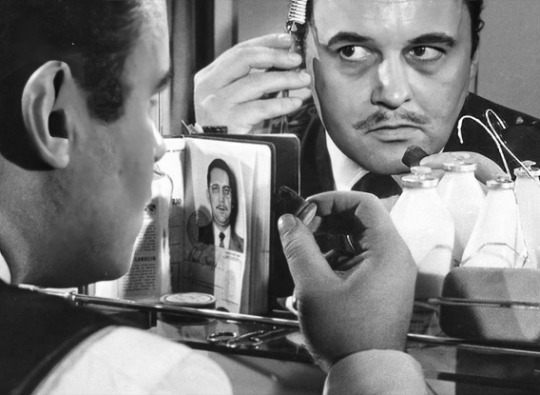
ACROSS THE BRIDGE
1:30 PM
This adaptation of a Graham Greene tale improves upon the original thanks to some added plot twists. Rod Steiger gives a compelling performance as an arrogant industry captain caught embezzling. Fleeing to Mexico he impulsively switches identities with another rider and throws the body off the train. Unfortunately, his choice of victim lands him in a worse predicament. The film won rave reviews and great box-office receipts in England but remains virtually unknown in the U.S. Leave it to NOIR CITY to fix that!
UNITED KINGDOM (1957) Dir. Ken Annakin. 103 min.

ZERO FOCUS / ZERO NO SHÔTEN
3:30 PM
This many-layered mystery is only one of several crime-laced dramas by the great (if still largely unheralded) director Yoshitarô Nomura. Newlywed bride Teiko Uhara sees her husband Kenichi off on one last business trip to his old office in Kanazawa; she eagerly anticipates his return so they can start their new life. But Kenichi mysteriously vanishes and when the police move too slowly, resourceful and tenacious Teiko begins her own investigation. This cross between slow-burning character study and thriller is a tense and spellbinding experience. In Japanese with English subtitles
JAPAN (1961) Dir. Yoshitarô Nomura. 95 min.
TICKETS FOR saturdAY MATINÉE DOUBLE FEATURE
Saturday Evening • January 27DOUBLE FEATURE
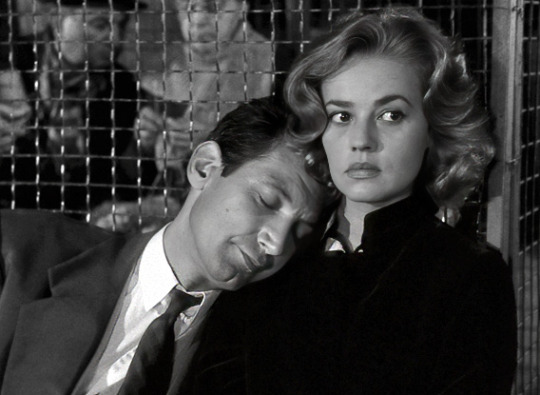
ELEVATOR TO THE GALLOWS / ASCENSEUR POUR L'ÉCHAFAUD
7:30 PM
Louis Malle bridges classic noir and the French New Wave with peerless style. An adulterous couple's slick plot to murder the woman's husband collides with a pair of bungling teens acting out their nihilistic crime-movie fantasies. Jeanne Moreau is immortalized as she takes the greatest nocturnal stroll in cinema history as Miles Davis' improvised score caresses her like a night breeze. Meanwhile, Maurice Ronet's attempts to escape a stalled elevator become a mesmerizing visual poem of entrapment. French noir doesn't come any cooler than this. In French with English subtitles.
FRANCE (1958) Dir. Louis Malle. 91 min.
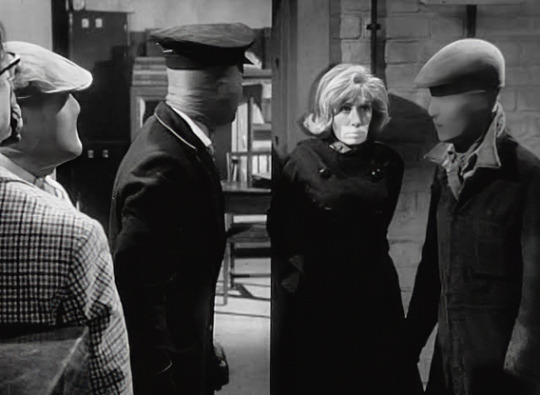
STRONGROOM
9:30 PM
A programmer with no well-known actors, this obscurity exploits a unique premise: A trio of crooks knocks over a suburban London bank at Saturday closing, leaving the manager and his secretary locked in the vault. Dissention roils the gang, however, when they realize Monday is Easter holiday and the captives will suffocate before being discovered. Not wanting to add murder their résumés, the crooks must break back into the bank while still evading capture. A film that had been all-but-forgotten—until this NOIR CITY revival!
UNITED KINGDOM (1962) Dir. Vernon Sewell. 80 min.
TICKETS FOR saturday evening DOUBLE FEATURE
#noir city#noir city oakland#noir city 21#film nor foundation#film noir festival#film noir#imogen sara smith#eddie muller
8 notes
·
View notes
